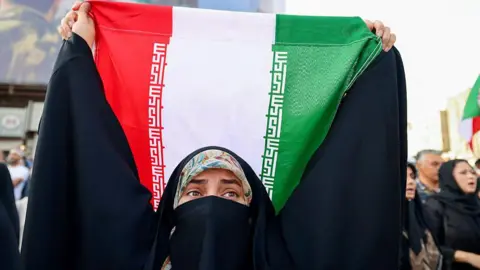The recent military strikes on Iran’s key nuclear sites by the United States have left many Iranians in a state of shock and fear. As the tensions escalate, individuals express their feelings of paralysis and uncertainty, fearing an impending conflict between their nation and foreign powers. Shahla, whose name has been altered for her safety, described her emotional state in a message to BBC Persian, stating, “My days and nights are the same. I feel paralysed. I just stare at the ceiling all day and all night.” This profound sense of despair is echoed throughout the Iranian populace, as citizens grapple with the implications of the strikes.
President Donald Trump announced that facilities in Isfahan, Natanz, and Fordo had been “obliterated.” His remarks offered Iran’s leadership a stark ultimatum: choose between “peace or tragedy.” In response, Iranian Foreign Minister Abbas Araghchi declared that the United States had crossed a “big red line,” warning that the repercussions of this action would be significant and long-lasting. The situation has escalated quickly, as just over a week prior, Israel had initiated a large-scale air campaign against Iran, claiming it was necessary to neutralize perceived existential threats stemming from Iran’s nuclear ambitions.
The impact of these military operations has been devastating, with Iran’s health ministry reporting at least 430 fatalities. However, independent human rights organizations suggest that the actual toll might be significantly higher. In retaliation, Iran has launched missiles targeting Israeli cities, resulting in casualties on both sides—Israeli authorities report that 24 individuals have been killed in the strikes.
Amid these tumultuous events, the Iranian government has restricted internet access, further isolating citizens and impeding the flow of accurate information. Nonetheless, individuals have managed to express their discontent. One such person, referred to as Mehri, conveyed feelings of profound sorrow and anger, connecting her emotions to the broader geopolitical conflict. She perceives the current crisis as a clash driven by personal ambitions of three leaders: Trump, Israeli Prime Minister Benjamin Netanyahu, and Iran’s Supreme Leader Ali Khamenei.
Homayoun, a resident from the northwestern region of Maku, displayed resilience, asserting, “Yes, we’re going through tough times – but we’ll stand by our country to the very end. And if needed, we’ll give our lives for our homeland.” His defiant tone reflects a sentiment among some that they will not allow foreign intervention to dictate Iran’s fate. Earlier, Trump had warned Iran that any retaliation would face a stronger military response, but Iranian officials remained steadfast, asserting that they reserved all methods to protect their sovereignty.
The Islamic Revolution Guard Corps (IRGC) views US bases in the region as “vulnerabilities,” rather than strengths. Tensions have reached a point where Iranian military figures have hinted at targeting US naval assets if the US continues its involvement in Iran’s nuclear facilities. There are even calls among hardliners for the closure of the strategic Strait of Hormuz, crucial for global shipping.
In the midst of this chaos, a young woman fleeing Tehran highlighted her hope that future change in Iran would originate from within rather than be imposed by foreign powers. The desire for an organically driven transformation is prevalent among some citizens, who believe that self-determination is vital in their pursuit of a better future.
Another individual reflected critically on Iran’s nuclear ambitions and the societal costs associated with them. Farhad, whose name has been changed for confidentiality, lamented the sacrifices made for projects like Fordo and Natanz, indicating that, although he didn’t agree with military actions, Iran’s past approaches have been intolerable.
As the situation continues to develop, the responses of ordinary Iranians reveal a deeply complex emotional landscape shaped by fear, pride, and a yearning for a future that aligns with their hopes and dreams for a peaceful and prosperous Iran. The voices of the Iranian people echo a desire for both change and stability amidst the uncertainties that come with military conflict.



